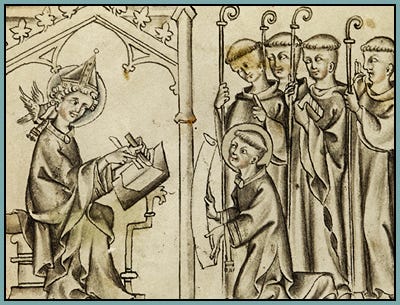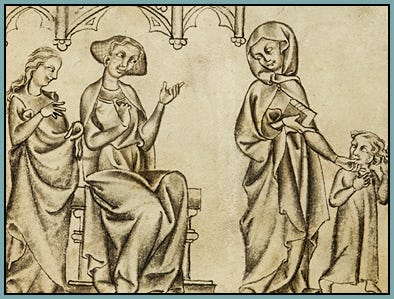The Rule of Christendom
“And for this I am sent, that we might eat together of the gifts of Almighty God.”
A bright young country lad came up to the university at Rome, lifted a foot to enter, but on an impulse turned and fled, not so much as having touched the polluted stair. A few years later, miles out among the hills, some shepherds saw the bushes move: Was it a lion? a sheep? When they parted the brambles, lo, it was that country lad, St. Benedict. What are you doing? they asked. Praying, he said. Why? they asked. Because we should seek first the Kingdom of Heaven. May we join you? they asked. And he replied that they could if they asked three times. They did and to make a very long story short, in a thousand years they became Europe.
—Dr. John Senior

We ended on Sunday with a dramatic, really quite shocking, episode from Book Two of St. Gregory the Great’s Dialogues: having fallen, through no fault of his own, into the pit of carnal temptation, St. Benedict “overcame the sin, because he changed the fire”—that is to say, he used an inferno of physical pain to smother the flames of disordered passion. His furnace of choice was a patch of nettles and briars, which burned and tore his naked flesh until the false desires had departed, and the true had returned.
These are not the actions of an ordinary man. They are scarcely the actions of any type of man—believers might wonder if he had already transcended the limits of mortal life, and nonbelievers might wonder if he was simply a madman. The latter question is somewhat understandable, insofar as the fervent souls of yore sometimes did things that nowadays would suggest psychological instability. I bring this up not to diminish Benedict’s deeds but to portray them as all the more extraordinary, because in his case, the accusation of madness or even serious eccentricity is simply untenable: to study the Rule of St. Benedict is to study also the mind of its author, and in the Rule we find a masterpiece of wisdom, balance, and moderation. As Gregory the Dialogist said,
He wrote a rule for his monks, that was excellent for its discretion…. If one wishes to more fully understand his character and life, he can find in the dispositions of the rule the exact image of all the actions of the master, for this holy man could not otherwise teach, than how he himself lived.
Keep reading with a 7-day free trial
Subscribe to Via Mediaevalis to keep reading this post and get 7 days of free access to the full post archives.





